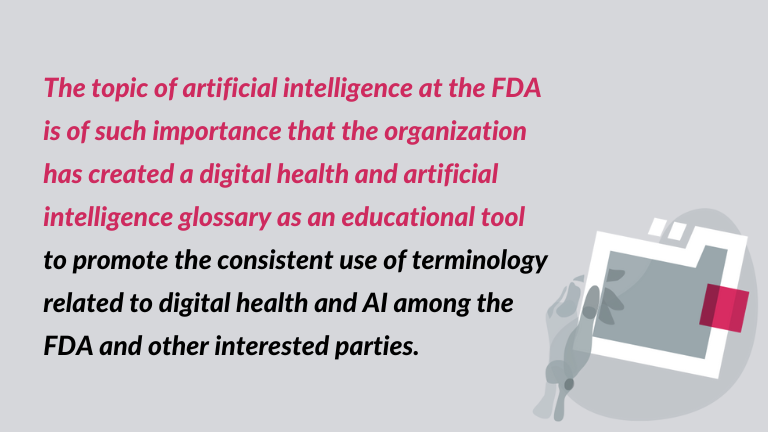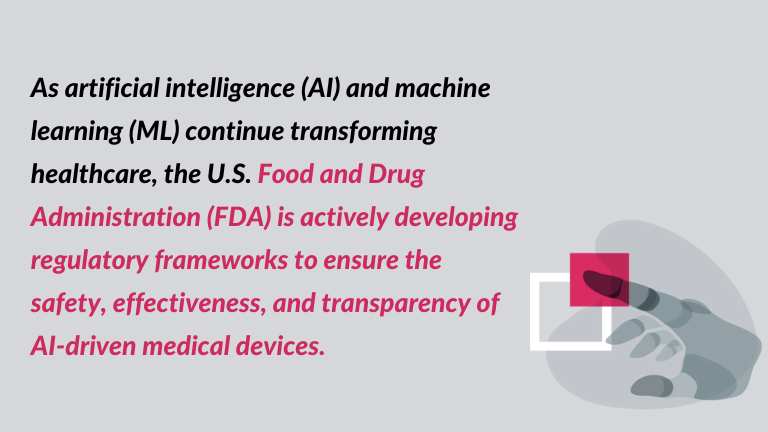Artificial Intelligence in FDA regulations: compliance and challenges
Modern medicine generates vast amounts of data every day. This data provides doctors with the opportunity to gain new insights that can enhance the diagnosis process and also lead to personalized treatment plans. Consequently, this can result in improved patient outcomes. Artificial intelligence (AI) and machine learning are significant in this context. Manufacturers of software as a medical device are incorporating AI technology into their products. This helps healthcare professionals, including radiologi. As a result, regulatory agencies are also paying closer attention to this innovative area of medical development. Let’s explore artificial intelligence according to FDA and find out how the U.S. Food and Drug Administration addresses the issue of artificial intelligence in healthcare.
Artificial intelligence in FDA: definitions
Artificial Intelligence (AI) is a machine-driven system designed to achieve specific human-defined objectives by making predictions, recommendations, or decisions that impact real or virtual environments. AI systems process inputs from both machines and humans to perceive these environments, analyze and model their perceptions automatically, and generate informed options for action or information through model inference.
Machine learning consists of techniques that enable AI algorithms to enhance their performance on a task by learning from data. [1]
The topic of artificial intelligence at the FDA is of such importance that the organization has created a digital health and artificial intelligence glossary as an educational tool to promote the consistent use of terminology related to digital health as well as AI among the FDA and other interested parties. [2]

How is the FDA considering the regulation of medical devices using AI and ML?
As artificial intelligence (AI) and machine learning (ML) continue transforming healthcare, the U.S. Food and Drug Administration is actively developing regulatory frameworks to ensure the safety, effectiveness, and transparency of AI-driven medical devices. These devices undergo evaluation through established premarket pathways, including premarket clearance (510(k)), De Novo classification, and premarket approval. Depending on the risk level, modifications to AI-enabled software as a medical device (SaMD) may also require premarket review. There is no doubt that artificial intelligence in FDA is an important area.

Challenges in regulating AI/ML medical devices
Traditional FDA regulatory models were not designed for the dynamic nature of AI and also ML, which continuously learn and evolve. As these technologies advance, regulatory approaches must also adapt to maintain patient safety and device effectiveness. Moreover, many AI/ML-driven medical device modifications require premarket review, leading the FDA to explore new oversight frameworks to address these challenges. [3]
Key FDA Actions in AI/ML Regulation
To address regulatory challenges in AI/ML-based medical devices, the FDA has implemented several key initiatives to enhance guidance and transparency. Artificial intelligence in FDA:
- April 2, 2019: Released the discussion paper Proposed Regulatory Framework for Modifications to AI/ML-Based Software as a Medical Device (SaMD), outlining potential approaches for premarket review of AI/ML software modifications.
- January 2021: Introduced the AI/ML Software as a Medical Device Action Plan, reinforcing the agency’s commitment to safe and innovative AI applications.
- October 2021: Published Good Machine Learning Practice for Medical Device Development: Guiding Principles to establish best practices for AI/ML-based medical devices.
- April 2023: Issued draft guidance on Marketing Submission Recommendations for a Predetermined Change Control Plan for AI/ML-Enabled Device Software Functions, providing recommendations for managing AI-driven modifications.
- October 2023: Released Predetermined Change Control Plans for Machine Learning-Enabled Medical Devices: Guiding Principles, refining regulatory expectations for AI-driven changes.
- June 2024: Introduced Transparency for Machine Learning-Enabled Medical Devices: Guiding Principles, emphasizing openness and patient safety.
- December 2024: Plans to finalize guidance on Marketing Submission Recommendations for a Predetermined Change Control Plan for AI-Enabled Device Software Functions. [4]
Coordinated approach to AI regulation
On March 15, 2024, the FDA released Artificial Intelligence and Medical Products: How CBER, CDER, CDRH, and OCP are Working Together. This document details the agency’s collaborative efforts across the Center for Biologics Evaluation and Research (CBER), Center for Drug Evaluation and Research (CDER), Center for Devices and Radiological Health (CDRH), and Office of Combination Products (OCP) to harmonize AI regulatory approaches and share best practices.
2025 draft guidance: advancing AI oversight
On January 6, 2025, the FDA issued Draft Guidance: Artificial Intelligence-Enabled Device Software Functions—Lifecycle Management and Marketing Submission Recommendations, which provides:
- Considerations for lifecycle management of AI-enabled devices.
- Recommendations for marketing submissions.
- Integration of AI-specific requirements within existing regulatory frameworks.
- Transparency measures to ensure product safety and effectiveness.
Additionally, the FDA has published separate draft guidance on AI applications in drug and biologic development, reinforcing its commitment to a comprehensive and consistent approach to AI regulation across the healthcare sector. [5]
The FDA stays attentive to ongoing developments
The FDA remains committed to refining its regulatory approach for AI/ML medical devices. It strives to balance innovation with patient safety and also regulatory clarity. Through comprehensive guidance and inter-agency collaboration, the agency is establishing a structured yet adaptable framework to support the advancement of AI-driven medical technologies. As AI continues to transform healthcare, the FDA’s ongoing efforts will be essential in ensuring these innovations enhance patient care. The agency will also uphold stringent safety and effectiveness standards. We will certainly return to this very interesting topic of artificial intelligence in FDA in our posts.
References
[1] Artificial Intelligence and Machine Learning in Software as a Medical Device, FDA, https://www.fda.gov/medical-devices/software-medical-device-samd/artificial-intelligence-and-machine-learning-software-medical-device#subscribe
[2-5] FDA Digital Health and Artificial Intelligence Glossary – Educational Resource, FDA, https://www.fda.gov/science-research/artificial-intelligence-and-medical-products/fda-digital-health-and-artificial-intelligence-glossary-educational-resource